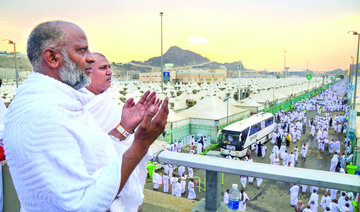MAKKAH: King Salman will cover the cost of sacrificial animals for 5,000 pilgrims hosted by the Hajj guest program, an official said.
The offer includes all pilgrims from more than 80 countries hosted by the Guests of King Salman for Hajj and Umrah, said secretary-general of the program, Abdullah bin Mudlaj Al-Mudlaj.
These include relatives of slain soldiers from Palestine, the Egyptian army and police, as well as relatives of Sudanese army personnel who were killed in the Decisive Storm and Restoring Hope operations.
Al-Mudlaj said the number of beneficiaries this Hajj season stands at 5,000, compared to 2,400 last year.
The executive committee of the program has begun work to implement the offer in coordination with the concerned agencies, while all the beneficiaries have been informed of the offer, he added.
The Hajj guest program is coordinated with Islamic figures in different countries around the world. It helps bolster relations between the Kingdom and peoples of Arab and Islamic countries, including Qatari nationals recently hosted by the king.
Meanwhile Tawfiq Al-Sudairi, the deputy minister of Islamic affairs, call and guidance, stressed the history of the Kingdom in disassociating Hajj from political and sectarian divides.
He said: “The Kingdom has disassociated Hajj from politicization and political and sectarian slogans since it was founded by King Abdul Aziz bin Abdul Rahman. He emphasized that … Saudi officials always emphasize this strategic concept, from which all governmental authorities and service programs are launched to assist pilgrims. Therefore, it is always being reaffirmed that Hajj is a religious ritual that must be elevated and that it is so much purer than political and sectarian matters.”
Meanwhile, a Palestinian woman from Gaza wept as she stood in front of a photo of King Salman in the lobby of a hotel hosting the families of martyrs of Palestine who came to perform Hajj.
Ruwdha Abdulhameed, 63, pointed to the King’s photo and in her local Arabic dialect said: “I send my greetings to King Salman. May Allah give him a long life because he is supporter of Palestine … and we are proud of him.”
She said she has been termed as the “mother of a martyr” because her son was killed at the age of 25, and her two grandsons were also martyred. She said her sufferings faded when she arrived in the Kingdom.
“The sons of Palestine are your sons, and Saudi youths are our sons. Our lives are sacrificed for Palestine and Al-Aqsa, of which we are proud,” she said.
Around 1,000 Palestinian pilgrims will perform Hajj this year at the king’s expense under the Guests of King Salman for Hajj and Umrah program.
Pilgrim Aisha Abul-Qasim hopes that Hajj will be a good opportunity to pray for her son, Ayman Jibril, a mine expert in the Sudanese army who died four months ago.
Abul-Qasim is one of 10 Sudanese mothers who lost loved ones fighting with the Saudi-led Arab coalition in Yemen who will perform Hajj this season as guests of King Salman.
With tears in her eyes, Aisha said that her son had four sons of his own when he died. She said that she has spent most of her days taking care of them since April 22, when the Sudanese armed forces informed her that her son was killed.
“The Saudi Embassy in Khartoum facilitated our travel procedures to Jeddah airport. They completed the procedures in record time,” said Abul-Qasim. She also said that the Sudanese pilgrims were given a welcome reception before they were taken to a hotel in Al-Rusayfah in Makkah.
King Salman to cover cost of sacrificial animals for 5,000 pilgrims on Hajj program
King Salman to cover cost of sacrificial animals for 5,000 pilgrims on Hajj program

‘Masterpieces of Saudi Orchestra’ shine at Maraya in AlUla

- The concert on its opening night presented a seamless artistic journey, where orchestral works met Saudi musical identity
- It underlined the Music Commission’s aim to present Saudi artistry at a high professional level
RIYADH: The “Masterpieces of Saudi Orchestra” concert opened at Maraya Concert Hall in AlUla on Thursday under the patronage of the Kingdom’s Minister of Culture and Chairman of the board of the Music Commission Prince Bader bin Abdullah.
Organized by the Music Commission, the concert on its opening night presented a seamless artistic journey, where orchestral works met Saudi musical identity.
The Saudi National Orchestra and Choir, conducted by Maestro Hani Farhat, led audiences through carefully curated pieces reflecting heritage and modern creativity.
The repertoire combined traditional influences with orchestral scoring, offering listeners heritage-based compositions alongside recent arrangements.
Regional rhythms and layered musical textures were used to echo the Kingdom’s history, while pieces rooted in Saudi classical music tradition connected audiences with familiar cultural references in a fresh format.
The concert underlined the Music Commission’s aim to present Saudi artistry at a high professional level.
The series seeks to honor national heritage while encouraging contemporary artistic engagement, and its growing local and international presence was highlighted throughout the evening.
The program also featured a visual dimension led by the Theater and Performing Arts Commission, which staged live performances of Saudi folk arts.
Audiences saw presentations of Samri, Dahha, Rafeihi, Yanbawi, Zair and Khabeeti, synchronized with the orchestra to create one integrated artistic experience.
These folk elements were arranged to complement the orchestral sound, reinforcing the richness and variety of Saudi cultural identity. The combination of music and movement aimed to show how traditional forms can engage with large-scale concert settings while retaining their historical character and community roots.
This performance is an extension of the series of successes achieved by the Saudi Orchestra’s masterpieces both locally and internationally, and reaffirms the Music Commission’s commitment to showcasing Saudi music in its finest form.














